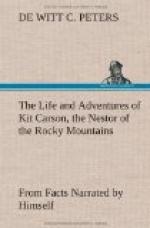CHAPTER XVI.
A fresh Campaign set on foot—Col. Cook in Command—Kit Carson goes as Guide—The Apaches and Utahs leagued together—The Roughness of the Country and the Privations to which the Command was exposed—The Indians overhauled—A running Fight—The Advantages gained—The Chase resumed—The Apaches resort to their old Tricks—Col. Cook is obliged to return to Abiquiu—A Utah taken Prisoner through Mistake—Kit Carson goes to Taos and has a Conference with the Chiefs of the Utah Nation—Cook’s second Scout—He is caught in a furious Snow-storm and obliged to return to Rio Colorado—Major Brooks and Reinforcements come to the Rescue—Major Brooks on the Lookout, but fails to find the Indians—Carleton’s Expedition—Kit Carson goes with it as Guide—The Adventures met with—Kit Carson’s Prophecy comes true—The Muache Band of Utahs summoned by Kit Carson to a Grand Council—Troubles brewing among these Indians—The Small Pox carries off their Head Men.
To retrieve the ground lost, and also, to show the Jiccarilla Apaches that their recent victory had tended only to stimulate the movements of the Americans to a display of greater activity and energy, after a brief space of time, a large body of regular troops were made ready to take the field against them. The commander of this expedition was Col. Cook of the 2d Regiment of United States dragoons. That officer chose for his principal guide Kit Carson, whose peace duties as Indian Agent had been abruptly arrested by the warlike attitude of some of his Indians. It was necessary, also, that Kit Carson should be on the ground in case the red men were overtaken, in order to ascertain whether, or no, the Utahs were mixed up with the operations of the Apaches. A large branch of the former tribe were part and parcel of his agency, and the two nations were known to be on very friendly terms with each other; consequently, it was surmised that they might be secretly, and under disguise, acting together in the war.
Col. Cook employed, besides the troops of the line which were under his command, some forty men selected from among the Mexican and Pueblo Indians, whose duties were to act as spies and trailers.
These Pueblos were selected for spies on account of their being familiar with Indian habits and their mode of warfare. They were taken from among the best hunters which the Pueblo villages could furnish. They presented themselves provided with their own horses, rifles, and, in most cases, with their own ammunition, and were supplied only with their rations of food. When it was practicable, they were allowed to kill game; and, being very expert at it, they seldom returned from a hunt open-handed. Their peaceful mode of life prevented them from engaging in any deep league with the hostile Indians; but yet, there is no doubt that when the different tribes were at war with the whites, the Pueblos harbored the warlike Indians and




